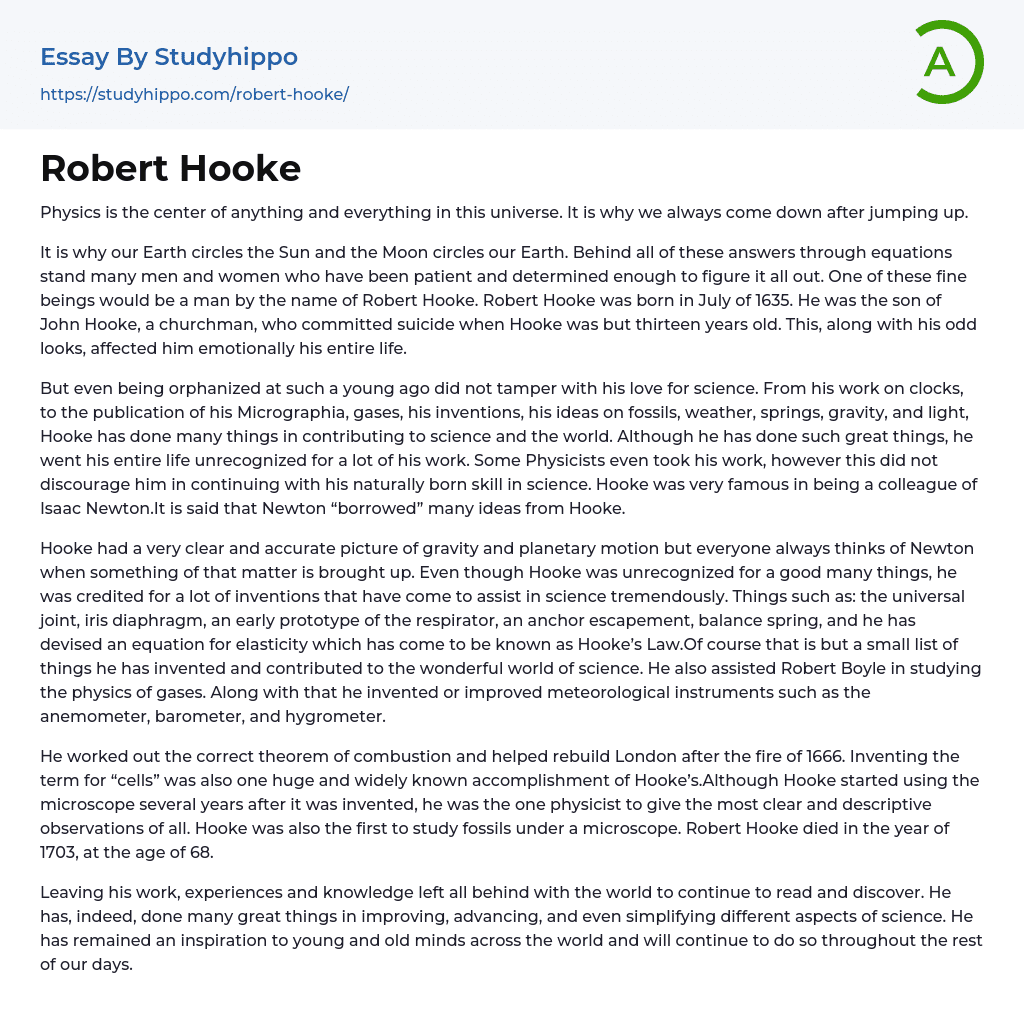Having been born in July 1635, Robert Hooke was one of the persistent individuals who discovered with patience and determination why our Earth orbits the Sun and why the Moon orbits our Earth. Unfortunately, when he was only 13 years old, his father - a churchman - took his own life, leaving a lasting emotional impact on him alongside his distinctive appearance.
Despite losing his parents at an early age, Hooke's passion for science never wavered. He made significant contributions to the field through his work on clocks and publication of Micrographia. Additionally, he conducted research on gases, invented various devices, proposed ideas about fossils and weather patterns, studied springs and gravity, and investigated lig
...ht. Despite some physicists committing plagiarism with regards to his work and many of his accomplishments going unacknowledged during his lifetime; Hooke remained determined in pursuing his natural talent for science. He was also a well-known colleague of Isaac Newton, with some believing that Newton 'borrowed' many of Hooke's ideas.
Although Hooke's grasp of gravity and planetary motion was clear and accurate, his contributions in these areas are often overshadowed by Newton. Nevertheless, Hooke made significant scientific breakthroughs through the invention of various devices such as the universal joint, iris diaphragm, early respirator prototype, anchor escapement, balance spring and the development of Hooke's Law for elasticity. Furthermore, he collaborated with Robert Boyle to study gas physics while also improving or inventing meteorological instruments like anemometers, barometers and hygrometers. These advancements have
had a profound impact on science.
Robert Hooke accomplished several significant achievements during his lifetime, including the formulation of the correct theorem of combustion and playing a role in the reconstruction of London after the devastating fire of 1666. Additionally, he is widely known for coining the term "cells". Despite starting to use the microscope several years after its invention, Hooke provided the most precise and detailed observations among physicists. He was also the first to study fossils under a microscope. At age 68, Robert Hooke passed away in 1703.
Despite leaving behind his work, experiences, and knowledge, this individual's contributions to the advancement and simplification of various fields of science remain. His legacy continues to inspire individuals of all ages across the globe for years to come.
- Energy essays
- Density essays
- Thermodynamics essays
- Motion essays
- Atom essays
- Sound essays
- Electricity essays
- Nuclear Power essays
- Temperature essays
- Physiology essays
- Light essays
- Force essays
- Heat essays
- Speed essays
- Big Bang Theory essays
- Energy Development essays
- The elements essays
- Voltage essays
- Solar Energy essays
- Nuclear Energy essays
- Alternative Energy essays
- Melting essays
- Nuclear Family essays
- Culture essays
- Social Control essays
- Citizenship essays
- Social Justice essays
- Caste System essays
- Social Responsibility essays
- Socialization essays
- Deviance essays
- Modern Society essays
- Popularity essays
- Civil Society essays
- Community essays
- Female essays
- Filipino People essays
- Igbo People essays
- Indigenous Australians essays
- Indigenous Peoples essays
- Minority Group essays
- Social Institution essays
- Men essays
- The nation essays
- Middle Class essays
- Social Norms essays
- Discourse Community essays
- Popular Culture essays
- Car Culture essays
- American Culture essays




